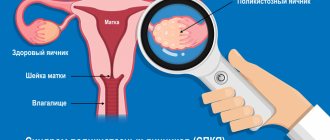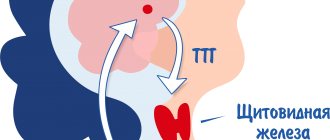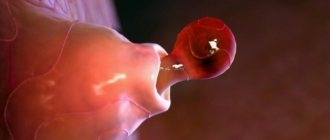| Name of service | Service price, rub. |
| Blood test for thyroid-stimulating hormone | 500 |
Thyroid-stimulating hormone, or TSH, is synthesized by the pituitary gland and regulates the most important functions of the thyroid gland.
TSH stimulates the thyroid gland to produce thyroid hormones. A thyroid-stimulating hormone test is prescribed in the following cases:
- enlargement of the thyroid gland;
- suspicion of hypo- or hyperthyroidism;
- diagnosis of female and male infertility;
- risk assessment of thyroid diseases in newborns;
- control in the treatment of thyroid diseases.
A pediatrician or therapist, endocrinologist, gynecologist, neurologist, or surgeon can prescribe a study. Venous blood is used for the study, and the test must be taken in the first half of the day on an empty stomach.
You can get tested for thyroid-stimulating hormone at the Meditsina LLC clinic. Our medical center is located in close proximity to the Yugo-Zapadnaya metro station.
Our clinic constantly hosts promotions
Complexes with this research
Thyroid gland Extended study of hormonal levels of the thyroid gland RUB 4,080 Composition
Nutritionist recommends Metabolic status assessment RUB 7,570 Composition
Male anti-aging diagnostics Monitoring of basic indicators in men aged 40+ 13,300 RUR Composition
IN OTHER COMPLEXES
- Advanced women's anti-aging diagnostics RUB 28,680
- Fitness control of sports nutrition 5 140 RUR
- Women's anti-aging diagnostics RUB 12,070
- Women's check-up No. 1 RUB 19,290
- Thyroid screening RUB 2,950
Preparation and donation of blood for hormones
At the preparatory stage it is necessary:
- Stop taking medications that affect thyroid hormone levels – one month in advance.
- Eliminate consumption of iodine-containing foods (fish, seaweed, etc.), spices, spicy and fried foods – 7 days in advance.
- Avoid coffee, iodine-containing medications, and alcohol – 72 hours in advance.
- Eliminate nicotine – 24 hours before.
Blood sampling is carried out exclusively in the morning, on an empty stomach and after half an hour of rest (stress or excitement is not allowed).
Detailed description of the study
Thyroid-stimulating hormone (TSH) serves as an important link in the regulation of the thyroid gland. It is produced by a small organ located in the brain called the pituitary gland. According to its structure, it belongs to the endocrine glands. TSH acts on thyroid cells to produce and release the thyroid hormones thyroxine (T4) and triiodothyronine (T3) into the blood.
T4 and T3 help regulate the speed of the body's metabolic processes. They are also important for the normal development of pregnancy. The thyroid gland produces more thyroxine, but it is inactive and is converted into the much more active T3 in the tissues.
TSH, together with thyrotropin-releasing hormone (TRH), coming from the hypothalamus, helps maintain sufficient concentrations of thyroxine and triiodothyronine in the blood.
In case of reduced levels of these hormones in the blood, the pituitary gland increases the production of TSH under the influence of TRH. TSH released into the blood stimulates the production of T4 and T3. With an increased content of these hormones in the body, the reverse mechanism begins to operate. The pituitary gland produces less TSH, which leads to lower levels of thyroxine and triiodothyronine. Normally, such a system allows you to stabilize the content of thyroid hormones in the blood.
If the thyroid gland produces excessive amounts of T4 and T3, a person experiences symptoms caused by an overactive thyroid gland (hyperthyroidism). These include weight loss, sweating, mood swings, anxiety, sleep disturbances and some other manifestations.
The most common cause of this condition is Graves' disease, an autoimmune disease in which the patient's immune system produces autoantibodies that activate the TSH receptor. This leads to the production of excessive amounts of thyroid hormones. In response, the pituitary gland produces less TSH, causing the level of this hormone in the blood to decrease.
An underactive thyroid gland is called hypothyroidism. In this case, symptoms such as weight gain, dry skin, excessive sensitivity to cold, and constant fatigue may be observed.
Hashimoto's thyroiditis is the most common cause of hypothyroidism. This is a chronic autoimmune disease in which the immune response causes inflammation of the gland, as well as the production of antibodies to the cells of the own thyroid gland. With Hashimoto's thyroiditis, hormone production decreases. As a result, the pituitary gland usually increases the release of TSH.
However, solely assessing TSH concentrations does not always predict or reflect thyroid disease. Some people with pituitary disease produce an abnormal form of TSH that does not function properly. They often have hypothyroidism despite TSH levels being normal or slightly elevated.
Changes in the amount of TSH may be associated with disruption of the pituitary gland. In addition, hyperthyroidism or hypothyroidism occurs if damage to another gland, the hypothalamus, is detected.
Indications for hormonal testing
Blood testing for hormones must be done if the following health disorders are suspected:
- Hyperthyroidism with suppressed/increased thyroid function
- Tumors of any origin
- Goiters of any type
Symptoms associated with the manifestation of these pathologies:
- Heartbeat disorders
- Bug-eyed
- Weight loss/gain, regardless of appetite
- Changing the size of the thyroid gland
- Hair loss
- Sudden change of mood
- Decreased libido
- Sweating, chilliness, temperature fluctuations
- Violation of the female cycle
- Diagnosed infertility
After surgery and therapy for hormonal dysfunction, the blood is also examined for hormone concentrations.
Hormonal tests in pregnant women are an essential part of pregnancy management. Deficiency or excess of thyroid hormones harms the development of the fetus, the formation of its vital organs depends on them: the cardiovascular system, brain, etc.
Thyroid-stimulating hormone - TSH
Thyroid-stimulating hormone (TSH) is a pituitary hormone that regulates the functioning of the thyroid gland. A study of its level is the most informative indicator in diagnosing her diseases.
The molecular weight of TSH is about 28 kDa. Its synthesis is carried out by the anterior pituitary gland. Under the influence of the hormone, the formation of thyroid hormones (i.e., hormones produced by the thyroid gland) and their release are activated; it initiates the growth and reproduction of thyroid cells. The production and release (synthesis and secretion) of TSH is influenced by thyrotropin-releasing hormone of the hypothalamus. Activation of the process begins if the concentration of circulating thyroid hormones decreases. The levels of TSH and T4 produced are inversely proportional: the higher the T4 level, the less TSH production and vice versa, the less T4, the more intensely thyroid-stimulating hormone is produced. Thus, the amount of thyroid hormones is compensated and their normal content is maintained. The amount of TSH released is influenced by various processes of the body's nervous system. The level of the hormone changes during sleep, with changes in temperature, with nonspecific stress (activity of the nervous system that arises when it is necessary to respond to a new situation - an increase in general tone, heightened perception of the senses (vision, hearing, smell) or, conversely, their dulling, concentration of attention , knowledge of the surrounding world, etc.). In addition, the concentration of TSH depends on the time of day: maximum levels are observed at 2-4 hours and remain at a high level until 6-8 hours; The lowest level of the hormone is at 17-18 hours. The reference values given in the interpretation of the results were derived based on the examination of patients in the period from 8 to 18 hours. When you are awake at night, the rhythm of hormone release occurs.
A clear disruption of the thyroid gland, in which the level of hormones it produces decreases (severe primary hypothyroidism) causes a significant increase in the concentration of TSH. Primary hyperthyroidism (excessive production of thyroid hormones), on the contrary, leads to a significant decrease in TSH concentration, sometimes so low that it cannot be detected. By studying the quantitative content of thyroid-stimulating hormone, it is also possible to identify the disease in the subclinical stage - when pronounced symptoms are not yet observed and hormone levels are maintained in the normal range. Testing TSH concentration is the only way to initially evaluate the condition of the thyroid gland. The test can be performed in combination with a study of the concentration of free thyroxine (T4).
T4 medications taken the day before blood sampling do not affect test results in any way. Replacement treatment with L-thyroxine for hypothyroidism (insufficient production of thyroid hormones) very slowly normalizes the TSH concentration - weeks and sometimes months. This is explained by the fact that chronic severe hypothyroidism causes excessive formation of cells of the anterior pituitary gland (thyrotrophs), which produce TSH. In this case, an uncharacteristic condition occurs, artificially provoked by the use of the drug - a simultaneous increase in the level of TSH and T4. Monitoring the ongoing treatment involves periodic sampling, but if the amount or type of drug changes, it is not reasonable to take blood samples earlier than after 6 weeks.
Secondary and tertiary hypothyroidism, which occurs due to dysfunction of the pituitary gland and hypothalamus, are characterized by very low concentrations of thyroid hormones (T3 and T4). In this case, the TSH content is normal or slightly elevated, but its biological activity is reduced. Secondary hyperthyroidism can occur due to the formation of tumors of the anterior pituitary gland that secrete TSH, but such cases are rare.
TSH concentrations may change during severe illnesses not associated with thyroid dysfunction. The hormone levels can be affected by the drugs used in treatment or the consequences of the disease itself. A decreased TSH level is characteristic of the acute stage of the disease, and a slightly increased level is characteristic of the recovery period. If there is a need for examination, then the boundaries of the reference values of the TSH level are expanded (0.02-10 mU/l) and, along with the determination of TSH, the level of total or free T4 is examined.
Changes in the quantitative content of TSH occur for physiological reasons during pregnancy. The process is explained by the fact that a few days after fertilization of the egg, the outer shell of the embryo (chorion) begins to produce large amounts of human chorionic gonadotropin, a hormone structurally similar to TSH. Due to its similarity, it is able to stimulate the production of thyroid hormones. The first trimester is characterized by a temporary increase in T4 levels and a decrease in TSH levels. Over the next two trimesters, the concentration of thyroid-stimulating hormone normalizes. Its high level at the beginning of pregnancy may be a signal that a woman has latent hypothyroidism, which poses a potential danger to the developing child.
Decoding the indicators of the main hormones
Normal hormonal levels look like this:
| TSH | T3 | T4 | AT-TG | Calcitonin, in pmol/l | ||
| free | total | free | total | |||
| 0.4-4 mU/l | 2,6-5,7 Pmol/l | 1,3-2,7 Nmol/l | 10-22 Pmol/l | 58-161 Nmol/l | Not higher than 40 IU/ml | Up to 1.46 in women and up to 2.46 in men |
Deviations from the norm indicate the degree of thyroid dysfunction:
- In primary hypothyroidism, T3 and T4 will be low/normal, TSH will be high.
- In secondary hypothyroidism, T3 and T4 are low, and TSH is high.
- In hyperthyroidism, T3 and T4 are high, TSH is low.
A high concentration of TSH always means a decrease in the productivity of the thyroid gland; low values indicate its excessive activity.
Hormone levels indicate many health problems at their initial stage and allow for timely treatment of serious diseases.
In the medical city of Lobnya you can take a blood test for thyroid hormones ( T3 , T4 , TSH , etc.) at competitive prices. We guarantee quick results.
Cost of services
| Service code | Name of test/service | Deadline, calendar days | price, rub. |
| 7.1.A1.201 | Thyroid-stimulating hormone (TSH) | 1 | 450 |
| 7.1.A2.201 | Free thyroxine (free T4) | 1 | 450 |
| 7.1.A3.201 | Free triiodothyronine (free T3) | 1 | 450 |
| 7.1.A4.201 | Total thyroxine (total T4) | 1 | 490 |
| 7.1.A5.201 | Total triiodothyronine (T3 total) | 1 | 490 |
| 7.1.A6.201 | Antibodies to thyroglobulin (Anti-TG) | 1 | 500 |
| 7.1.A7.201 | Antibodies to microsomal thyroid peroxidase (Anti-TPO) | 1 | 500 |
| 9.0.A13.201 | Antibodies to thyroid-stimulating hormone receptors (AT rTSH) | 5 | 1270 |
| 7.1.A8.201 | Thyroglobulin | 1 | 750 |
| 7.1.A10.201 | Serum thyroxine binding capacity (T-uptake) | 5 | 1270 |
How to prepare for research
Two days before the test, you must stop taking hormonal medications (in consultation with your doctor).
The level of thyroid-stimulating hormone can be influenced by physical and psychological conditions, and its increase is also observed in infectious diseases. In the third trimester of pregnancy, TSH is also elevated.
Therefore, the study must be coordinated with a doctor. There are also general recommendations for preparing for a thyroid-stimulating hormone test:
- 24 hours before the analysis, avoid physical and emotional stress;
- 3 hours before the test do not smoke;
- 2-3 hours before the test, do not eat or drink anything other than clean, still water.
At the Meditsina LLC clinic, in addition to laboratory tests, you can get advice from specialists in any field of medicine. In particular, you will receive all the information about the correct preparation for the analysis.







